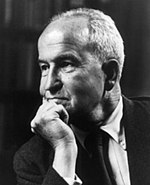Henry A. Murray
| Henry Murray | |
|---|---|

Henry Murray
|
|
| Born |
May 13, 1893 New York City |
| Died | June 23, 1988 (aged 95) Cambridge, Massachusetts |
| Nationality | American |
| Fields | Psychology |
| Institutions | Harvard University |
| Known for | Personality psychology |
| Influences | Carl Jung |
| Influenced | Abraham Maslow |
Henry Alexander Murray (May 13, 1893 – June 23, 1988) was an American psychologist who taught for over 30 years at Harvard University. He was Director of the Harvard Psychological Clinic in the School of Arts and Sciences after 1930 and collaborated with Stanley Cobb, Bullard Professor of Neuropathology at the Medical School, to introduce psychoanalysis into the Harvard curriculum but to keep those who taught it away from the decision-making apparatus in Vienna. He and Cobb set the stage for the founding of the Boston Psychoanalytic Society after 1931, but both were excluded from membership on political grounds. While personality theory in psychology was becoming dominated by the statistics of trait theory, Murray developed a theory of personality called personology, based on "need" and "press". Patterned after chemistry's Henderson–Hasselbalch equation for the pH of a solution, personology was a holistic approach that studied the person at many levels of complexity all at the same time by an interdisciplinary team of investigators. Murray was also a co-developer, with Christiana Morgan, of the Thematic Apperception Test (TAT), which he referred to as "the second best-seller that Harvard ever published, second only to the Harvard Handbook of Music."
Henry Murray was born into a wealthy family in New York in 1893. He had an older sister and a younger brother. Carver and Scheier, in "Perspectives on Personality" p. 100, note that "he got on well with his father but had a poor relationship with his mother", resulting in a deep-seated feeling of depression. They hypothesize that the disruption of this relationship led Murray to be especially aware of people's needs and their importance as underlying determinants of behavior. At Harvard, he majored in history with a poor performance, but compensated with football, rowing and boxing. At Columbia University he did much better in medicine, completed his M.D. and also received an M.A. in biology, in 1919. For the next two years he was an instructor in physiology at Harvard. He received his doctorate in biochemistry from the University of Cambridge in 1928.
...
Wikipedia
